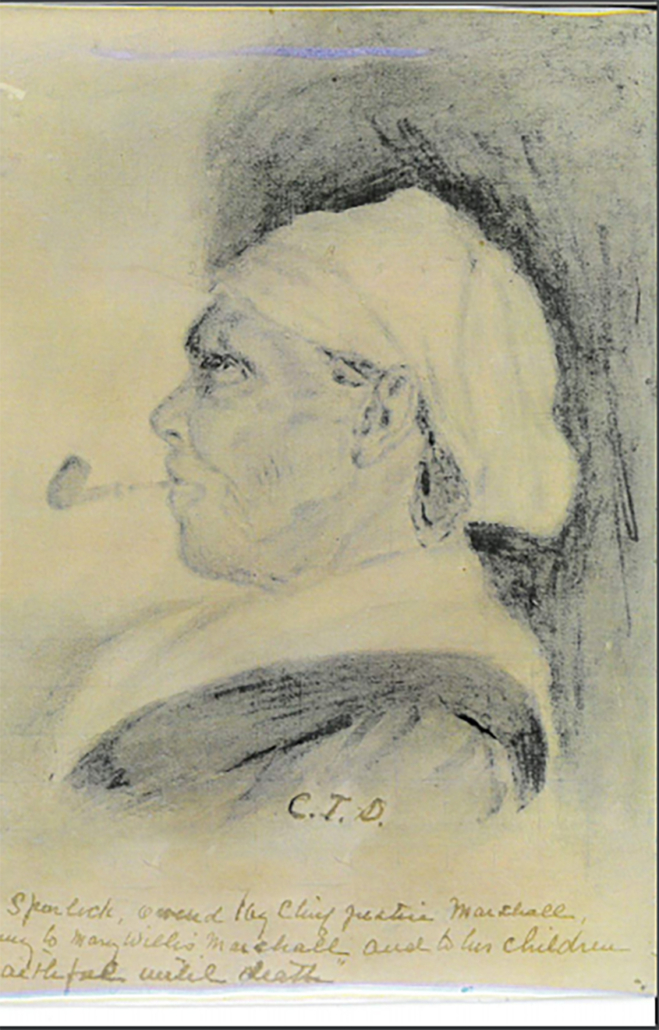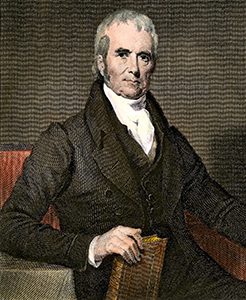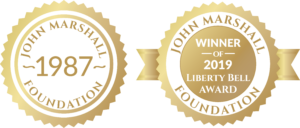
A sketch of Agnes Spurlock, daughter of Robin Spurlock, Marshall’s enslaved butler. Agnes Spurlock Hilton’s 1901 obituary: Agnes Spurlock Hilton died 25 JAN 1901, having served five generations of the Marshall-Douthat families. Her father, Robin Spurlock, was given as a wedding present to Chief Justice John Marshall. At the age of 18 Agnes was sent to serve Mrs. John Marshall of Fauquier County where she stayed until the marriage of Mary Willis Marshall to Fielding Lewis Douthat who brought her to Weyanoke. While at Weyanoke Agnes was evidently married to Moses Hilton. She and Moses are among the seven freedmen with whom Articles of Agreement for the sharecropping of Weyanoke Farm were executed and Fielding Douthat 07 MAR 1866 [sic], and approved by the local agent of the Freedmen’s Bureau. Original, National Archives. (John Marshall Center)
John Marshall and Slavery
John Marshall, like most of Virginia’s middle and upper classes at the turn of the 19th century, inhabited a socio-economic structure built upon the institution of slavery. While he left behind little evidence that would allow contemporary historians to fully understand his personal views on slavery, the limited information below can help us understand how Marshall interacted with a society that relied on enslaved labor.
John Marshall received Robin Spurlock, an enslaved African close in age to his own, as a wedding gift from Marshall’s father. Over the course of his adult life, Marshall acquired through purchase, inheritance, and birth enslaved Africans who labored at his properties in Richmond, and in the counties of Charles City, Fauquier, and Henrico. At the time of his death, the enslaved population at these properties likely neared 200 individuals.
In 1823, Marshall became the first president of the Richmond branch of the American Colonization Society, which encouraged the voluntary return of free Africans to the West African colony of Liberia. In his will, Marshall offered Robin Spurlock emancipation and $100 if he opted to relocate there, or $50 if he chose emancipation in the US. Marshall’s will also contained a provision for Spurlock to choose an owner from among Marshall’s children. In his 70s at the time, Spurlock chose to stay in Richmond and was held in trust for Marshall’s daughter, Mary Harvie.
As America reexamines its founding, the institution of race-based slavery, and how it tells history, the John Marshall Center recommits to:
- honest exchange about the past,
- highest scholarly standards and research, and
- inclusive narratives.
The John Marshall Center seeks to study, understand, learn from, and teach America’s history and those who made it.
John Marshall Center for Constitutional History & Civics
Mailing Address
PO Box 7090
Richmond, VA 23221
Physical Address
Virginia Museum of History & Culture
428 N. Arthur Ashe Blvd.
Richmond, VA 23220
Phone: 804.775.0861
John Marshall Center for Constitutional History & Civics is a non-partisan, non-profit 501(c)(3) tax-exempt organization.
All donations are tax-deductible to the extent allowed by law.


